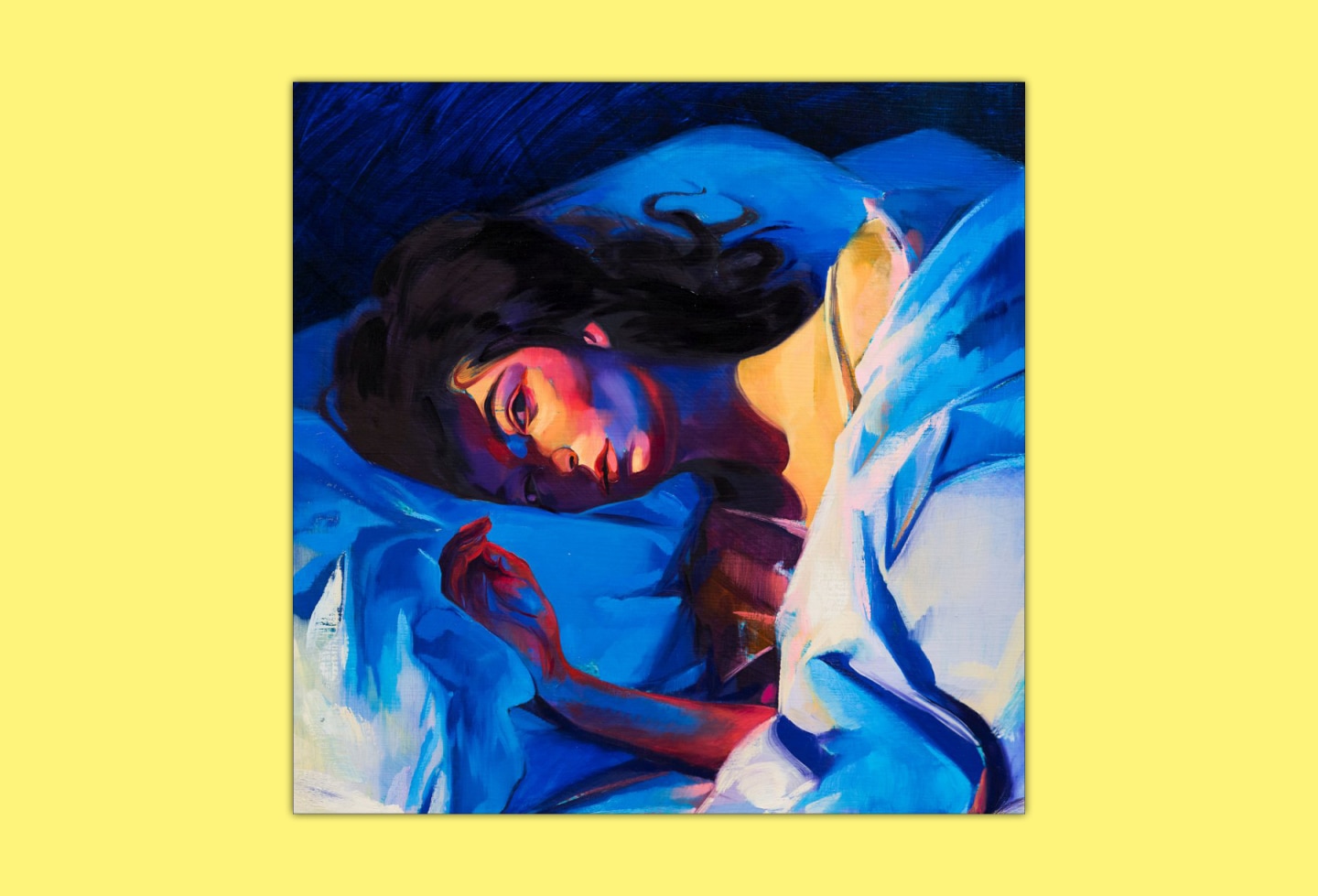
Lorde's long-time-coming second album is here, and it's a doozy. While her 2013 debut was a collection of head-buzzing love songs about high school friendship, Melodrama is a darker take on the last dregs of youth, full of heartbroken jams about feeling alone in crowded rooms.
According to Lorde, it's actually a loose concept album, its events unfolding at a single house party. In honor of the release, we had a little party of our own. Below, four FADER editors — Myles Tanzer, Owen Myers, Aimee Cliff, and Patrick D. McDermott — trade thoughts about the excellent record, Lorde's evolution as a storyteller, and why she stands out in today's pop landscape.
Myles Tanzer: I can’t say I was super excited about “Green Light.” Maybe I felt like I was being forced to like it via the heaps of Twitter enthusiasm. Maybe I was worried that Jack Antonoff, who co-produced Melodrama, would end up having too much influence on the album's sound. ("Green Light,” with its kooky structure and anthemic intentions, would fit in perfectly on Antonoff's new Bleachers album, Gone Now.) But when I watched Lorde perform the song earlier this month at Governors Ball, I realized how wrong I was, and how well the single actually fits into her catalogue. And now, having now heard the full LP, I also grasp how the song is part of a collection that breaks new ground, but still feels very authentic to the Lorde that we already know.
Patrick, what are your thoughts about how the tweaks she’s made to her sound on this album?
Patrick D. McDermott: To my ear, the sound of Melodrama is a remarkable upgrade. I was a huge fan of “Green Light” off the bat. I love that it’s such an opener; that nearly a cappella first verse would likely empty a dancefloor in the middle of a set, but it works great here, as an introduction.
Overall, Melodrama feels like a map of a freshly expanded universe, one drawn by a music nerd with a bevy of new resources and collaborators at her disposal. You can hear the patchwork of Lorde’s influences more clearly than on her debut, which was maybe too forward-thinking to be at all nostalgic. Now, though, we’ve got Kate Bush-like wails on “Writer in the Dark,” second single “Liability” has the folksy unease of mid-career Bright Eyes, and the guitar outro of “The Lourve” sounds like Disintegration-era The Cure, or maybe something by The Cranberries.
But, like Myles said, these still feel like Lorde songs, thanks to some of her not-so-subtle trademark touches: wordy pre-choruses, dynamic tomfoolery, sentimental poetry. There's thematic threads, too. Owen, how do you think Melodrama advances the stories Lorde started telling on Pure Heroine?
Owen Myers: In a music world where this month’s other big pop album has clunky lyrics like “[I’m] Marylin Monroe in a monster truck,” I’ll take Ella Yelich O’Connor’s unabashed sincerity any day. Pure Heroine wore its heart on its sleeve, capturing the minutiae of teenage life, knowing full well that it couldn’t stay that way forever (“It feels so scary, getting old,” went “Ribs”).
Melodrama dives headfirst into the realities of growing up, the emotional ups and downs of young adulthood. It takes me right back to the years I spent in my late teens and early 20s trying to figure out who I was — by getting blackout drunk all the time. Melodrama thrives on that messiness, from the carefree, wasted confidence of “Homemade Dynamite,” to the “The Louvre,” on which a biting call-and-answer pre-chorus flips between feelings of self-doubt and giddy romance. I think Melodrama taps into experiences that a lot of people have in common; she did, after all, test it out by listening on her phone on the subway.
Aimee, do you think this album will expand her audience?
“The pop music algorithm tells us people want playlists, but I think people actually want stories.” — Aimee Cliff
Aimee Cliff: I don’t think Melodrama is the sound of Lorde trying to expand her audience, but I also think that it will. Not to bring up Katy Perry again, because I sincerely hate to pit women in pop against one another, but something she said in a New York Times profile this week has really burrowed into my mind. Discussing the alt-pop influences on Witness, she said, “I’m going to stop making a playlist and just be the playlist.” The comment struck me as cynical and calculated, basically admitting her album is a curation of interesting sounds with little to bind them Melodrama, by contrast, weaves a compelling narrative. The pop music algorithm tells us people want playlists, but I think people actually want stories.
Whether or not Melodrama is actually huge in the “real world” feels irrelevant, because within the universe Lorde creates and inhabits on this record, the songs and lyrics are already classic. Lorde captures the self-importance of first love so well: “They’ll hang us in the Louvre,” goes one song. “They’ll talk about us,” goes another. When you’re wrapped up in the best night of your life, every detail feels wildly important, even if it’s of no significance to anyone but you.
Myles, how much did Lorde’s narrative "house party" concept influence your hearing of Melodrama?
Myles: That’s actually one of the things that I like the most. I do think it complicates this other narrative being pushed in pop right now, that going out is the worst (see: Alessia Cara’s “Here”). I feel like going out in your 20s is mostly a good time, but also sometimes super sad, and that’s what Lorde gets at here.
I’m particularly obsessed with “Liability.” Musically it recalls the vibes of Lady Gaga’s “Speechless,” but the message feels so fresh. I love picturing it as a soliloquy in a Broadway show — the drunkest and most beloved character taking center stage to really make you fall in love. It just feels spectacularly honest.
Owen: I’ve read a lot of chatter about how Jack Antonoff has shaped Lorde’s new sound — though that’s not entirely true, seeing as Lorde and Antonoff are equally credited as executive producers. The dark drama of Pure Heroine feels like it was the starting point for a lot of sounds on this record, and it definitely sounds more like a Lorde record than a Bleachers one.
To return to Patrick’s question about storytelling, I think that the music of Lorde’s co-produced tracks gives additional depth to the album’s narrative, like the Robyn-ish glow of “Supercut,” which feels like a synth-pop sequel to “Green Light.” The two reprise tracks add to this, too: “Sober II” is the pensive, morning-after answer to “Sober,” and on “Liability (Reprise)” she takes ownership of the flaws which she was pondering on its predecessor (“Whatcha gonna do?” she shrugs). These introspective moments feel like a sign of Lorde’s increased confidence as a writer and as a producer. I’ll be spending a lot of time with this record, but Melodrama also makes me excited for what’s next, for Lorde to continue developing into a pop auteur in control of every aspect of her music.
Aimee: It’s absolutely crucial not to undermine Lorde’s level of control here. Some of the most shiver-inducing moments on this record are about total self-ownership and self-respect, things so many young women battle with daily. The genius of Lorde’s writing is that, beneath the veneer of this being a “break-up album,” she’s actually written a record about a young woman learning to love herself.
On “Liability,” she paints a hauntingly bittersweet image of herself, dancing alone, calling her relationship with herself the “only love I haven’t screwed up.” Even on “Writer in the Dark,” where she gleefully allows herself to play the emotional ex with that “I’ll love you ‘till you call the cops” line Owen likes so much, she is knowing. It all feels like an act, an exercise, an intentionally melodramatic emotional release. Lorde knows that she’s got herself, and her gift for turning personal angst into huge-sounding sing-a-longs. “I stumbled on my secret power, I found a way to be without you, babe,” she sings. Maybe that’s all she needs.
“Going out in your 20s is mostly a good time, but also sometimes super sad, and that’s what Lorde gets at here.” — Myles Tanzer
Patrick: I’m glad that Lorde calls herself a “writer” on that song, because that’s how I see her. She’s always had a literary heart; in “Royals”-era interviews she talked about being influenced by 20th century wordsmith Raymond Carver, whose short stories tell of an ordinary world, full of ordinary people, who feel ordinary sadness. Lorde’s life has gotten significantly less ordinary since then, but her writing still has a true-to-life intensity, still feels rooted in the poetry of the everyday. Carver’s protagonists never have big epiphanies, and usually wind up having to face the fact that maybe happy endings don’t really exist. On Melodrama, Lorde seems to have a similar realization. In the final moments of the final track, the glitchy production falls away, and it’s just her and a piano. “What the fuck are perfect places anyway?” she asks, finally sure that she’s not sure at all.
